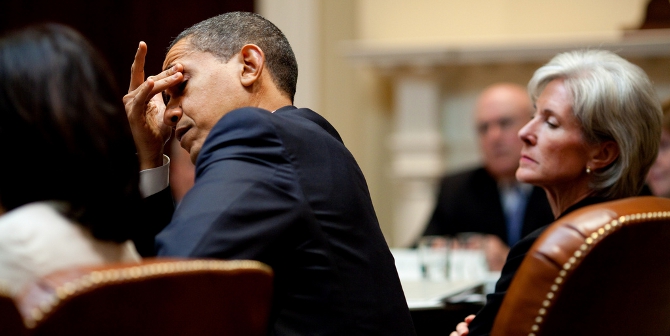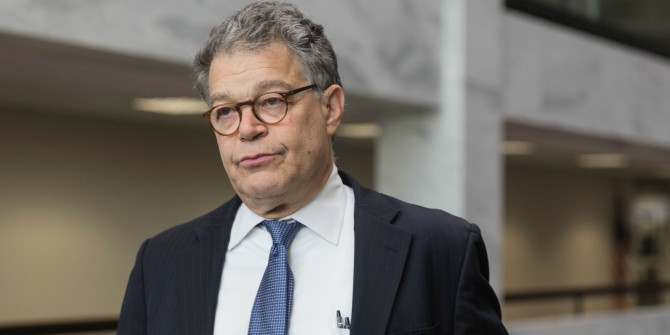 On 10 April, Secretary of Health and Human Services, Kathleen Sebelius, announced her resignation. While the Obama administration’s Obamacare policy has now enrolled of almost 8 million people, Sebelius was widely blamed for last year’s failures of the healthcare.gov website. MaryAnne Borrelli reflects on Sebelius’ resignation, writing that the trials that Sebelius weathered show the scale of the challenges directed at cabinet secretaries and HHS secretaries in particular. Her successor, Sylvia Burwell, is very likely to be at the center of the confrontations and culture wars that are conducted across and within the parties, just as Kathleen Sebelius has been.
On 10 April, Secretary of Health and Human Services, Kathleen Sebelius, announced her resignation. While the Obama administration’s Obamacare policy has now enrolled of almost 8 million people, Sebelius was widely blamed for last year’s failures of the healthcare.gov website. MaryAnne Borrelli reflects on Sebelius’ resignation, writing that the trials that Sebelius weathered show the scale of the challenges directed at cabinet secretaries and HHS secretaries in particular. Her successor, Sylvia Burwell, is very likely to be at the center of the confrontations and culture wars that are conducted across and within the parties, just as Kathleen Sebelius has been.
Last month, Kathleen Sebelius announced her resignation as the U.S. Secretary of Health and Human Services. Although the president praised her role in facilitating the healthcare insurance enrollment of almost 8 million people, political and media sources attributed Sebelius’ leaving to the initial failures of the heathcare.gov website, the most public manifestation of “Obamacare.” Her political and policy successes – overseeing the development of regulations that implemented the Affordable Healthcare Act, negotiating with Democratic and Republican governors regarding expansive changes in Medicaid, and weathering a series of court challenges that included a landmark Supreme Court ruling – were overshadowed by, in New Republic Jonathan Cohn’s phrasing, an “epic tech failure.”
But Sebelius’ experiences as a Health and Human Services secretary are not unique.
Sebelius is the twenty-first secretary of the department, which was established as the Department of Health, Education, and Welfare in 1953 and subsequently reorganized as the Department of Health and Human Services in 1979. (Education was then founded as a separate department and has sustained that status despite calls for its abolition from Republican presidential candidates and presidents.) She is the fifth woman in this secretarial office, a testimony to perceptions of the Department as presiding over “women’s issues” and, sometimes, to presidents allowing women to lead departments marginalized in their administrations. But Sebelius was named to head HHS when it was charged with advancing the president’s highest domestic policy priority. She also entered cabinet office with formidable credentials: She was a Democratic governor in Kansas, a strongly Republican state, having won re-election with 57.9% of the vote; and had previously served as the state’s insurance commissioner, earning the respect of health insurers. She continued to build a strong political reputation in Washington, until the failure of healthcare.gov. She is the second longest serving HHS secretary, surpassed only by Clinton HHS Secretary Donna E. Shalala, who held office for two full presidential terms.

The trials that Sebelius encountered (and mostly weathered) show the caliber of challenges directed at this secretarial post. Among cabinet departments, HHS has the largest budget. Official estimates for 2014 put the Department’s expenditures at $1.05 billion. Meanwhile, military costs in the Department of Defense are estimated at $637.6 million. This is why HHS secretaries-designate undergo two confirmation hearings, one with the Department’s Senate authorizing committee and the second with the Senate committee responsible for its appropriations. Other secretaries-designate appear before just one committee, allowing them to focus their efforts and their resources on a single forum. Even before entering office, the prospective HHS secretary is called upon to fulfill additional political obligations.
Also increasing the responsibilities – and the vulnerability – of the HHS secretary is the salience and significance of the policies administered by this Department. HHS agencies and programs include the Centers for Disease Control, the National Institutes for Health, the Food and Drug Administration, Medicare, and Medicaid. Funding allocations and guidelines for medical research (including stem cell research), standards for clinical trials and consumer safety, and access to healthcare (including reproductive rights) are all decided within HHS. Its decisions self-evidently fund and empower – or defund and disempower – closely-held values. HHS secretaries embody these rulings, which is why Sebelius has been so intensely criticized. Her Department generally, and health care reform specifically, impacts the life of the average person in the United States every day and most especially in times of personal crisis.
Cabinet secretaries are remembered for their ability to implement legislation, transforming comparatively vague mandates into effective programs. When implementation involves technological innovation, intense partisanship, and close media scrutiny, with profound consequences for the average citizen, management becomes even more important. Reflecting on her own learning, Sebelius remarked, “If I had a magic wand and could go back to mid-September and ask different questions based on what I know now, I would,” she said. “I thought I was getting the best information from the best experts, but clearly that didn’t go well.” The metaphor is well chosen: Magic wands and omniscience are myths, but there is still a widespread expectation that cabinet secretaries will have the wisdom and power to work miracles, perhaps especially when they are leading a department dedicated to the nation’s health and welfare.
HHS Secretary-designate Sylvia Mathews Burwell, the current director of the Office of Management and Budget, will want to take Sebelius’ words to heart. As a midterm nominee, Burwell is expected to continue the policy advances of her predecessor. With regard to healthcare reform, that is sure to impose real and sometimes surprising political burdens. Burwell’s chief resources are her budgetary expertise, her government experience in the Clinton and Obama administrations, and her executive leadership in the Wal-Mart and the Gates Foundations. Burwell lacks Sebelius’ electoral credentials, but Sebelius did not have Burwell’s budgetary knowledge. Heading into midterm elections, with the potential for a Republican majority in both legislative chambers, anticipating a lame duck presidency and a presidential election without a clear partisan advantage, and an emerging conservative majority on the Supreme Court, it’s impossible to say whether Burwell will be more advantageously situated than her predecessor. What can be confidently predicted is that the next HHS secretary will be at the center of continuing policy confrontations and culture wars, conducted across and within the parties, during the campaigns and while governing. The character and tone of those disputes will be evident in the coming weeks, as Senators position themselves for the impending confirmation hearings.
Featured image credit: Pete Souza [Public domain], via Wikimedia Commons.
Please read our comments policy before commenting.
Note: This article gives the views of the author, and not the position of USApp– American Politics and Policy, nor of the London School of Economics.
Shortened URL for this post: http://bit.ly/1norQAU
_________________________________
 MaryAnne Borrelli – Connecticut College
MaryAnne Borrelli – Connecticut College
MaryAnne Borrelli is a professor of government at Connecticut College. Her books and articles examine the construction of gender in the United States presidency, focusing on cabinet appointments and on the White House Office. Her research has contributed to the George W. Bush and the Obama transitions, and she has served as an interviewer for the Presidential Oral History Program at the University of Virginia’s Miller Center.






